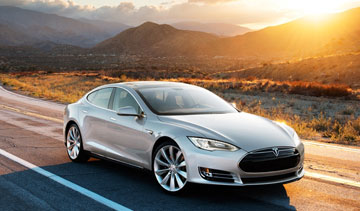
Electric car maker Tesla vows open access to its patents
by Michael Liedtke And Dee-Ann Durbin, The Associated Press

Analyst says Tesla realized it's better to be the best product in a large industry than the only product in a niche one
SAN FRANCISCO—Electric car maker Tesla Motors is unlocking its patents in an unusual effort to encourage electric vehicle development.
Tesla CEO Elon Musk promised to give away the company’s entire patent portfolio to all comers, as long as they promised not to engage in courtroom battles over intellectual property
“If we clear a path to the creation of compelling electric vehicles, but then lay intellectual property landmines behind us to inhibit others, we are acting in a manner contrary to that goal,” Musk wrote in a blog on the company’s Web site.
The decision will mean more collaboration with Tesla, which is already making electric systems for Daimler and Toyota. Other automakers using Tesla’s technology could potentially share the cost of Tesla’s charging stations, for example.
More charging stations could entice skeptical buyers to try electric cars.
Electric cars still make up less than one per cent of U.S. sales as drivers question their range and the lack of places to get a charge.
Palo Alto, California-based Tesla currently makes only the $70,000 Model S sedan, but is developing two others. Its Model X crossover is due out next year, and Tesla wants to start making a cheaper model by 2017. It’s currently scouting locations for a $5-billion battery factory to increase supplies.
But Musk said Tesla can’t make a dent in the market by itself, and thinks the patents could be a “modest” help to other companies developing electric cars. He says Tesla has gotten few requests for technology from rivals, but he thinks that’s partly because patents were blocking access.
Musk said Tesla discussed a potential Supercharger partnership with BMW this week. Currently, Tesla has about 100 Supercharger stations scattered across North America and Europe that give Model S drivers a free power source when travelling long distances, and it plans to open more in China and Japan this year. The technology is designed to replenish about half of the battery power within 20 minutes.
BMW spokesman Kenn Sparks confirmed the meeting.
Prashand Kumta, a professor at the University of Pittsburgh’s school of engineering, said Tesla’s lithium-ion battery technology isn’t unique. But how the company packages that technology and designs its cars could be useful to other companies.
At the start of this year, Tesla had been issued 203 patents covering its batteries and other key features that distinguish its electric cars from gasoline-powered vehicles. Another 280 patent applications are still pending in the U.S. and other countries, according to Tesla’s regulatory filings.
The earliest any of Tesla’s current patents expires is in 2026, so the company is relinquishing a potentially valuable long-term advantage by giving away its intellectual property to its rivals.
Analysts said the announcement has little downside for Tesla, and could solidify its leadership in the market.
“By opening its patents, Tesla rightly realizes it’s better to be the best product in a large industry than the only product in a niche one,” observed Silicon Valley entrepreneur Aaron Levie, the CEO of file-storing company Box Inc., in a June 12 post on his Twitter account.
